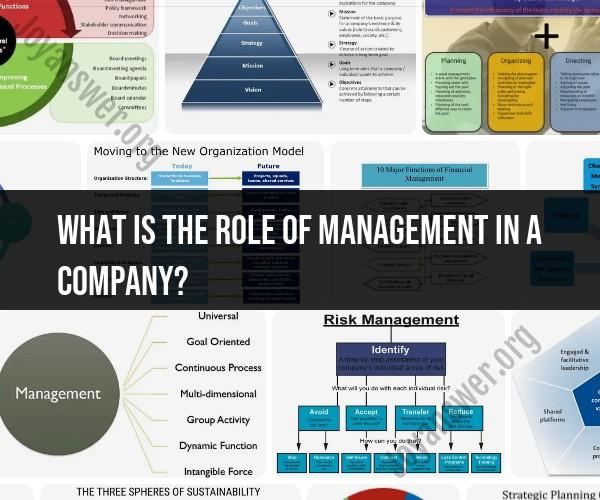What is the role of Management in a company?
Management plays a crucial role in the success of a company by overseeing and coordinating various aspects of the organization to achieve its goals and objectives. The role of management encompasses a wide range of responsibilities and functions, all of which are essential for the efficient and effective operation of a company. Here are some key aspects of the role of management in a company's success:
Strategic Planning: Management is responsible for setting the company's strategic direction. This involves defining long-term goals, formulating strategies to achieve them, and making decisions about resource allocation.
Decision-Making: Managers make critical decisions that impact the company's operations, including decisions related to investments, product development, market expansion, and resource allocation. Effective decision-making is essential for the company's success.
Organizing: Managers are responsible for organizing the company's resources, including people, finances, and materials, in a way that maximizes efficiency and productivity. This involves designing organizational structures and defining roles and responsibilities.
Leading and Motivating: Managers lead by example and motivate employees to work toward common goals. They inspire and guide employees, create a positive work culture, and ensure that teams are aligned with the company's mission and vision.
Communication: Effective communication is a key management function. Managers need to communicate goals, expectations, and changes within the organization to ensure that everyone is on the same page. Clear communication fosters understanding and teamwork.
Resource Allocation: Management is responsible for allocating resources, such as budgets, manpower, and technology, to various projects and departments based on their importance and priority. Efficient resource allocation is critical for achieving company objectives.
Performance Monitoring: Managers track and evaluate the performance of individuals, teams, and departments. This involves setting performance metrics, conducting performance reviews, and making adjustments as necessary to improve outcomes.
Problem Solving: Managers are often faced with challenges and problems that arise in the course of business operations. They need to identify issues, analyze root causes, and implement solutions to resolve problems and improve processes.
Adaptation to Change: In a dynamic business environment, management must be agile and capable of adapting to changes in the market, industry, and technology. This includes identifying opportunities and threats and making necessary adjustments to the company's strategies.
Risk Management: Managers assess and manage risks associated with the company's operations. This involves identifying potential risks, developing risk mitigation strategies, and ensuring compliance with regulations and industry standards.
Innovation and Continuous Improvement: Successful management encourages innovation and fosters a culture of continuous improvement. This helps the company stay competitive and adapt to evolving customer needs.
Financial Management: Managing the company's finances is a critical aspect of management. This includes budgeting, financial forecasting, monitoring expenses, and ensuring profitability and financial stability.
Customer Focus: Management should maintain a strong focus on understanding customer needs and delivering value to customers. Customer satisfaction is often a key driver of a company's success.
In summary, management is responsible for planning, organizing, leading, and controlling various aspects of a company's operations. Effective management ensures that the company's resources are used efficiently, its employees are motivated and productive, and its strategies are aligned with its mission and vision. Ultimately, the role of management is essential in driving a company's success and sustainability in a competitive business environment.
The Heart of a Business: The Role of Management
Management is the process of planning, organizing, staffing, leading, and controlling the resources of an organization to achieve its goals. Managers play a vital role in the success of any business. They are responsible for setting the company's direction, allocating resources, and motivating employees to achieve their goals.
There are many different levels of management, from first-line supervisors to top executives. Each level of management has its own unique responsibilities and challenges. However, all managers share the common goal of helping their organization to succeed.
Here are some of the key roles that managers play in a business:
- Set the company's direction: Managers are responsible for setting the company's strategic goals and objectives. They also develop plans to achieve these goals.
- Allocate resources: Managers are responsible for allocating the company's resources, such as people, money, and equipment. They need to ensure that resources are used efficiently and effectively to achieve the company's goals.
- Motivate employees: Managers are responsible for motivating employees to perform at their best. They need to create a positive work environment and provide employees with the resources and support they need to succeed.
- Make decisions: Managers are constantly making decisions that affect their employees and the company as a whole. They need to be able to weigh the pros and cons of different options and make the best decision for the company.
- Solve problems: Managers are responsible for solving problems that arise on a daily basis. They need to be able to think critically and come up with creative solutions.
Leading for Success: The Crucial Functions of Management
The four crucial functions of management are planning, organizing, leading, and controlling.
- Planning: Planning involves setting goals and developing plans to achieve those goals. Managers need to be able to think strategically and anticipate future trends.
- Organizing: Organizing involves creating a structure for the company and assigning work to employees. Managers need to be able to design efficient and effective processes.
- Leading: Leading involves motivating and inspiring employees to achieve their goals. Managers need to be able to build relationships with employees and create a positive work environment.
- Controlling: Controlling involves monitoring the company's progress and making adjustments as needed. Managers need to be able to identify potential problems and take corrective action.
Management Matters: The Impactful Role in Company Operations
Management plays a vital role in company operations. Managers are responsible for ensuring that the company's resources are used efficiently and effectively to achieve its goals. They also play a key role in motivating employees and creating a positive work environment.
Good management can have a significant impact on the success of a company. Companies with well-managed teams are more likely to be efficient, productive, and profitable. They are also more likely to be able to adapt to change and overcome challenges.
Here are some of the ways in which management can impact company operations:
- Increased efficiency: Managers can help to increase efficiency by streamlining processes and eliminating duplication of effort.
- Improved productivity: Managers can help to improve productivity by providing employees with the resources and support they need to succeed.
- Enhanced customer satisfaction: Managers can help to improve customer satisfaction by creating a customer-focused culture and ensuring that employees are trained to provide excellent customer service.
- Reduced costs: Managers can help to reduce costs by negotiating favorable contracts with suppliers and managing the company's resources efficiently.
- Increased profitability: Managers can help to increase profitability by growing the company's revenue and reducing costs.
Overall, management plays a vital role in the success of any business. Well-managed teams are more likely to be efficient, productive, and profitable.












